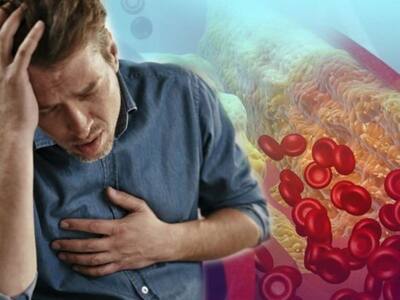
Here are 10 things that high cholesterol can do inside your body.
Cholesterol is a fatty and waxy substance that is found in the blood. Most of the cholesterol present inside the blood is made by the liver and the rest comes from the diet that one follows. Cholesterol travels in your blood bundled up in packets called lipoproteins.
If not managed, over time, high LDL cholesterol can severely damage your arteries, cause serious heart disease, and raise your risk of having a stroke. To avert such health complications, one must ensure that he/she is regularly checking cholesterol levels and doing everything possible to keep the bad cholesterol levels under check. Some of the easy tips to keep bad cholesterol under check and reduce the risk of heart disease are – managing diet, exercising regularly, lifestyle modifications, and medication. These easy home tips can help lessen the effects of heart disease and enhance the quality of life.
What Is The Normal Cholesterol Level?
The normal LDL cholesterol ranges for adults are as follows:
- Optimal: Less than 100 mg/dL (Anybody suffering from diabetes or heart disease should maintain this level).
- Near-Optimal: 100 to 129 mg/dL
- High-Risk Range: 130 to 159 mg/dL
- High: 160 to 189 mg/dL
- Extremely High: 190 mg/dL or more
What Happens When Cholesterol Levels Cross 200?
LDL cholesterol can build up in your arteries, obstructing them and reducing their flexibility, when your body generates too much of it. Atherosclerosis (hardening of the arteries) is the medical term for this particular condition. When there is an obstruction in the arteries, the normal blood flow is hindered, making it more difficult for the heart to pump and work. A buildup of too much cholesterol can lead to the creation of plaque, which aggravates heart conditions like heart attacks and stroke.
Speaking to TheHealthSite.com, Dr Sabyasachi Pal, Senior Consultant – Cardiology Department, BM Birla Heart Research Centre, Kolkata said, “When the cholesterol level is more than normal in our blood, there is always a chance of high tendency that it will enter the arterial wall and cause fatilation and that will in turn initiate the atherosclerotic process. This means the building up of fats, cholesterol, and other substances around the inner and medial walls of the arteries, and gradually blocking the arterial wall, this is medically known as atherosclerotic plaque. Ultimately the plaque increases the blockages and causes coronary ischemia in the presence of the fatty layer. If it is within the heart, then it will cause a heart attack; if it is within the brain artery, then it will cause a stroke; if it is in the kidney, then it will cause damage to the kidney; if it is on the leg side then it will cause some leg problem and sometimes the gangrene also.”
He further added, “So the rising cholesterol is always there and is a big problematic factor. But, it is not that every patient who has an increased level of cholesterol will face the same consequences. Because some of the consequences depend on other risk factors like the presence of diabetes, smoking, physical inactivity, genetic background, and others. Hence, the impact of cholesterol majorly matters in the presence of cumulative risk factors. Adopting a healthy lifestyle, consuming a lot of fruit and vegetables along with soluble fibre, and limited intake of salt and alcohol can help to balance the cholesterol level for a longer period.”
READ RELATED: Chaos To Clarity: Life Coach Helps Find Balance In A Hectic World
High Cholesterol Can Affect Your Brain
While you need some cholesterol for your brain to function properly, too much of it in the blood can be damaging and cause severe health issues inside your body.
An obstruction in blood flow caused by too much cholesterol in the arteries can cause strokes, which can damage certain regions of the brain and cause loss of memory, impaired movement, and difficulties speaking and swallowing, among other symptoms.
Too Much Bad Cholesterol Can Damage Your Digestive System
The production of bile, a fluid that aids in digestion and nutritional absorption in the intestines, requires cholesterol in the digestive tract.However, if your bile contains too much cholesterol, the excess crystallises into hard stones in your gallbladder.Gallstones may cause severe pain.
Total Wellness is now just a click away.
Follow us on
Don’t Miss Out on the Latest Updates.
Subscribe to Our Newsletter Today!
window.addEventListener(‘load’, (event) => {
$(‘#commentbtn’).on(“click”,function(){
(function(d, s, id) { var js, fjs = d.getElementsByTagName(s)[0]; if (d.getElementById(id)) return; js = d.createElement(s); js.id = id; js.src = “//connect.facebook.net/en_US/sdk.js#xfbml=1&version=v2.3”; fjs.parentNode.insertBefore(js, fjs);}(document, ‘script’, ‘facebook-jssdk’));
$(“.cmntbox”).toggle();
});
});








